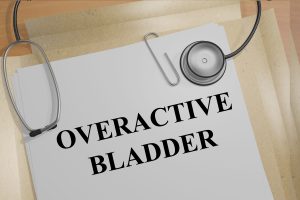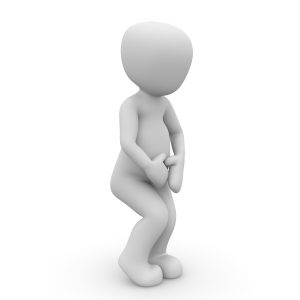There are many types of bladder dysfunction. It is important to carry out a  comprehensive assessment of bladder dysfunction in order to establish the type of dysfunction.
comprehensive assessment of bladder dysfunction in order to establish the type of dysfunction.
Stress Incontinence refers to a small spurt of urinary leakage with exertion generally sufficient to wet underwear only. It is caused by incompetent urethral sphincter and/or weak pelvic floor muscles.
Inpatient Care Plan for Stress Incontinence
Urgency/Urge Incontinence (Overactive Bladder) refers to an uncontrollable urgent desire to void (pass urine). This may result in wet clothing, urinary frequency, nocturia and/or nocturnal enuresis. Overactive bladder symptoms occur because the bladder contracts during the filling phase.
Inpatient Care Plan for Urgency/Urge Incontinence (Overactive Bladder)
Mixed Urge and Stress Incontinence refers to a combination of a small spurt of urinary leakage on exertion and whole bladder emptying associated with urgency, the underlying causes being an overactive bladder, an incompetent urethral sphincter and weak pelvic floor muscles. Refer to care plans as follows:
Inpatient Care Plan for Stress Incontinence
Inpatient Care Plan for Urgency/Urge Incontinence (Overactive Bladder).
Incomplete Bladder Emptying/Overflow Incontinence (also known as chronic retention) refers to a difficulty with bladder emptying. It is characterised by the involuntary release of urine from an overfull urinary bladder, often in the absence of any urge to urinate. This results in variable residual volumes of urine being retained in the bladder. Causes include outflow obstruction (e.g. enlarged prostate, urethral stricture), underactive bladder and poorly coordinated bladder muscle contraction and urethral sphincter relaxation whilst voiding.
Inpatient Care Plan for Incomplete Bladder Emptying/Overflow Incontinence
Functional Incontinence occurs in people who have normal bladder control but are unable to reach the toilet in time. This could be due  to physical or cognitive difficulties which make it difficult to get to the toilet and/or to communicate the need to go to the toilet. The term ‘functional incontinence’ refers to a physical and/or cognitive inability to use/find the toilet, adjust clothing etc.
to physical or cognitive difficulties which make it difficult to get to the toilet and/or to communicate the need to go to the toilet. The term ‘functional incontinence’ refers to a physical and/or cognitive inability to use/find the toilet, adjust clothing etc.
Inpatient Care Plan for Functional Incontinence
Nocturia (with or without nocturnal enuresis) refers to waking up to pass urine more than once per night. When a patient voids two or more times per night and is anxious/distressed by this, they need further assessment. Underlying causes include problems of fluid balance, neurological disorder affecting bladder control, disorders of the lower urinary tract, overactive bladder, prostate problems, hormonal changes, diabetes and cardiac problems. Nocturnal enuresis refers to the involuntary passage of urine whilst sleeping. It can be a symptom of an overactive bladder.
Inpatient Nocturia Care Plan (with or without Nocturnal Enuresis)